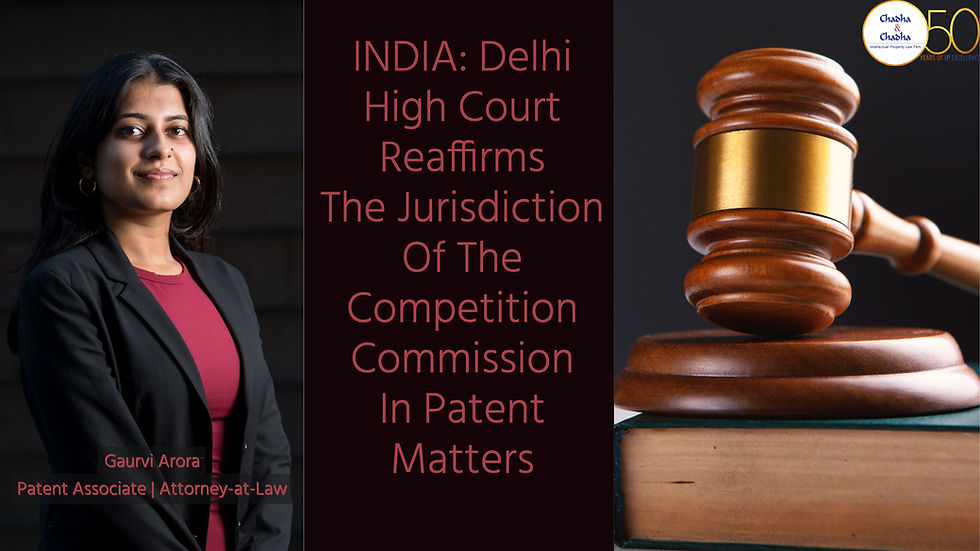INDIA: DELHI HIGH COURT REAFFIRMS THE JURISDICTION OF THE COMPETITION COMMISSION IN PATENT MATTERS
- Gaurvi Arora

- Sep 23, 2022
- 4 min read
On July 28, 2022, the Hon’ble Delhi High Court (hereinafter referred to as the “Court”), dismissing the writ petition filed by Vifor International Ltd (“the Petitioner”), held that the Competition Commission of India (CCI) cannot be denied authority to enquire a matter solely based on the fact that it deals with a patent. [W.P. (C) 11263/2022].
In XYZ (confidential) v. Vifor International (AG) [Case No. 05 of 2022], the Petitioner was alleged with anti-competitive practices including abuse of dominant position and discriminatory and anti-competitive pricing, with regard to the sale and distribution of its patented drug that is used for treating iron deficiency, under Section 19 of the Competition Act, 2002. It was claimed that the Petitioner was offering the drug to public procurers at a much lower price than to individual consumers. In connection with the complaint, the CCI called upon the Petitioner to submit responses on the following issues:
i. Details regarding Petitioner’s granted patent- Ferric carboxymaltose (FCM)
ii. No. of manufacturing/import licenses issued till date (and their copies)
iii. Details of companies that approached the Petitioner for any license/permission with regard to FCM in India
iv. No. of licenses/ permission denied and reasons for the same
v. Disputes/litigation in India pertaining to FCM
The Petitioner, however, submitted that the information solicited was commercially sensitive and in any case, evidences a roving enquiry initiated by CCI besides claiming that disclosure of the requisite information could expose the Petitioner to criminal proceedings under Article 271 of the Swiss Criminal Code. Further, placing reliance on the Bharti Airtel case [(2019) 2 SCC 521], the Petitioner contended that the CCI had overstepped its jurisdiction as the matter warranted enquiry and examination only under the Patents Act, 1970. The Petitioner also drew attention to Section 3(5) of the Competition Act, 2002, which protects the rights of a patent holder, conferred by the Patents Act, 1970, against any action which may be initiated to restrain any infringement or to impose reasonable conditions as may be necessary for protecting any of those rights. The Petitioner also cited Sections 85, 90, 102, and 107 along with other allied provisions of the Patents Act, 1970, to claim that these provisions create salutary safeguards with respect to the rights which may be claimed by a patent holder.
Countering Petitioner’s arguments, CCI submitted that the Petitioner’s concern over the disclosure of commercially sensitive information was inaccurate in light of Section 57 of the Competition Act, 2002 which imposes a restriction on disclosure of information. CCI also maintained that the Petitioner has the right to claim confidentiality with regard to any disclosure that it may make to the Commission during the investigation. With respect to the ambiguity concerning jurisdiction of CCI in patent-related matters, CCI relied on the findings of the Delhi High Court in Monsanto Holdings Pvt. Ltd. and Ors. v. CCI & Ors. [2020 SCC OnLine Del 598], wherein it was held that CCI’s authority cannot be disregarded merely because the actionable information relates to patent, as long as it is dealing with anti-competitive and unfair trade practices. CCI also emphatically argued that it is competent to deal with allegations related to anti-competitive agreements, unfair trade practices, abuse of dominant position as well as combinations which may come into being by merger or amalgamation of enterprises. The significant allegation of discriminatory pricing and refusal to deal in order to foreclose competition against the Petitioner justified the enquiry sought under Section 19 of the Competitions Act, 2002.
The Hon’ble Court held that the Petitioner’s apprehension concerning the breach of confidentiality was inexact. Concurring with the CCI’s contentions, the Court reiterated that the CCI’s authority cannot be disregarded merely because the actionable information relates to the patent, as long as it is dealing with anti-competitive and unfair trade practices. The Court stated that “the Commission is duly and statutorily empowered to deal with all information which it may receive with respect to actions that may impede competition, usher in an anti-competitive environment, relate to abuse of dominant position or the adoption of unfair trade practices.” Importantly, the Court opined that “…it is only when a complaint fails to raise the aforesaid issues and concerns itself solely or exclusively with violations of the Patent Act, 1970 or the infringement or enforcement of rights that may otherwise be conferred by that Act that it could be said that the information would fall outside the purview and power of enquiry of the Commission.” The Court held that, in summation, the writ petition stemmed from the erroneous presumption that the CCI would not deal with objections raised and disposed of the writ petition being premature and proceeded on apprehensions “which are clearly if not unfounded, unsubstantiated.”
The decision, thus, allowed CCI to continue with the proceedings taking into consideration the Petitioner’s objections, and with Petitioner to attend to notices issued by CCI and make disclosures and compliances ensured. The decision reaffirms the position of law in respect of CCI’s jurisdiction where information is related to a patent and significantly highlights the relevant factors to be considered in deciding CCI’s jurisdiction in matters involving mixed issues related to patent and competition law.

































Comments